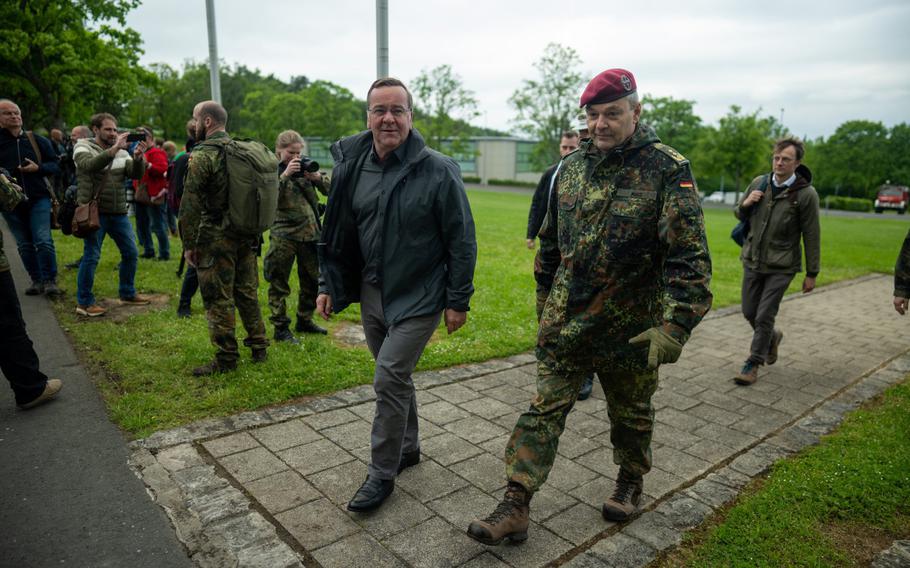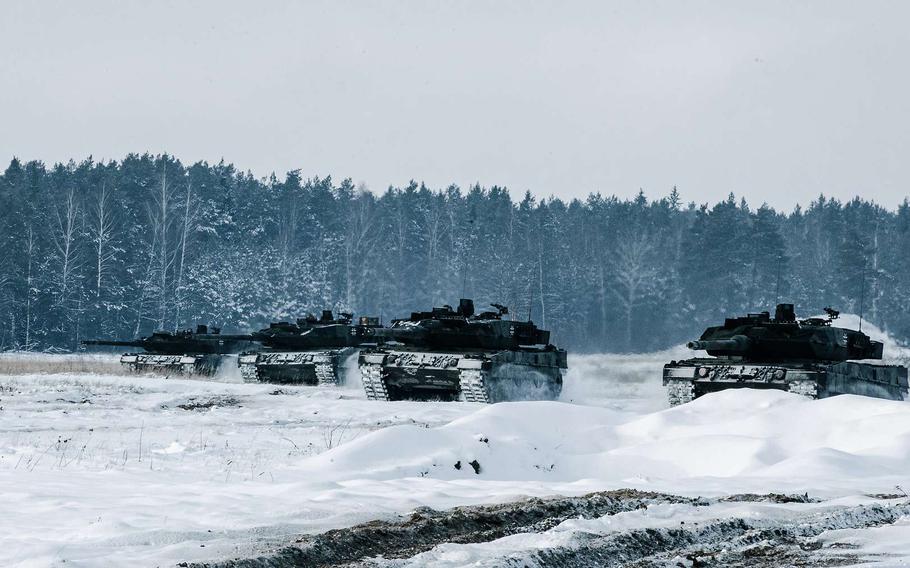
Lt. Gen. Alfons Mais, head of the German ground forces, welcomes Defense Minister Boris Pistorius during a visit in Hammelburg, Germany, on May 16, 2023. Mais said in a letter this week that the German army is missing everything "from A to Z." (German Defense Ministry)
STUTTGART, Germany — A German plan to reinforce NATO’s eastern flank by basing a brigade of soldiers in Lithuania is pushing the country’s poorly equipped army to the brink, with shortfalls ranging from artillery shells to tents, a top general warned this week.
“The blanket is simply too thin,” Lt. Gen. Alfons Mais, head of German army headquarters, wrote in a letter to Gen. Carsten Breuer, the German defense chief.
The equipment shortfalls and lack of funding highlighted in the letter reported on Tuesday by the German magazine Der Spiegel, are the latest example of the German military’s failure to live up to a pledge to ramp up defense spending.
Germany’s lackluster investment in NATO’s common defense has been a point of contention with the U.S. for years, especially during the tenure of former President Donald Trump, who accused Berlin of failing to shoulder its fair share of the security burden in Europe
In 2022, Chancellor Olaf Scholz said Germany would spend more than $100 billion to fast-track improvements to its military, but those investments are yet to materialize. And that has left the German ground forces in a dire situation.
Only about 60% of the army is sufficiently equipped, Mais said in the letter. And the situation will only get worse as Germany moves forward with a plan to incorporate a 5,000-troop-strong brigade designated for basing in Lithuania by 2027, he said.
“The establishment of a new major brigade without additional investment would reduce this number to 55%,” Mais said, adding that the service lacks everything from “A to Z.”

Lt. Gen. Alfons Mais, head of the German ground forces, talks with Defense Minister Boris Pistorius on May 16, 2023, at the German Infantry School in Hammelburg. Mais warned government leaders in a letter this week that plans to help reinforce NATO’s eastern flank by basing a brigade in Lithuania threaten to overextend Germany’s poorly equipped army. (German Defense Ministry)
Germany’s plan to station a brigade in Lithuania appeared to signal that it was poised to shake its reputation for punching below its economic weight on military matters.
The move was hailed as a “historic moment” last week by Defense Minister Boris Pistorius, who said during a news conference that it marks the first time the country will permanently station forces outside its borders.
But the situation also highlights the gap between Berlin’s stated desire to play a larger security role in Europe and delivering the funding necessary to make those ambitions a reality.
Even before Germany’s decision to base troops in Lithuania was finalized, Mais was sounding the alarm.
In a separate internal army memo made public by Bild in April, Mais warned that “the army will not be able to hold its own in high-intensity combat and will also only be able to fulfill its obligations to NATO to a limited extent.”
Some NATO countries have done more to prepare for a potential Russian attack than others. Poland, Romania and the Baltic states are among those that have taken big steps to modernize their respective forces.
Germany, Europe’s economic powerhouse, has struggled to keep pace despite being by far Europe’s wealthiest country.

An undated file image shows German Leopard 2 tanks participating in exercises in Lithuania. Lt. Gen. Alfons Mais, head of the German army, warned that increasing the engagement on NATO's eastern front is putting stress on an underfunded German military. (German Defense Ministry)
Since Russia’s full-scale invasion of Ukraine in February 2022, political leaders from across Europe have talked up the need for militaries across the Continent to rearm to counter the Kremlin threat.
In a Dec. 10 interview with the Frankfurter Allgemeine Sunday edition, Breuer said, “We might have to fight a defensive war one day.”
“We now see a (German military) that is not yet sufficiently equipped for this,” he added.
Belgian defense chief Adm. Michel Hofman issued similar warnings last week in an interview with news agency VRT, saying it was “absolutely possible” that Russia could have ambitions to attack either Moldova, which is not a NATO member, or the Baltic states.
“Europe must urgently prepare and make it clear that it can defend itself,” Hofman said.
Last week, Russian President Vladimir Putin dismissed talk of an invasion into NATO territory as “nonsense.”
“Russia has no reason, no interest — no geopolitical interest, neither economic, political nor military — to fight with NATO countries,” Putin said during a Dec. 17 interview with state media.